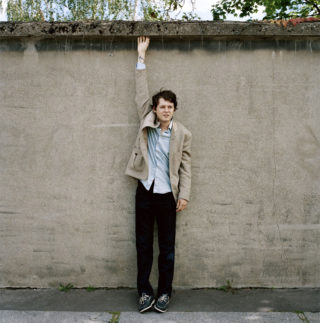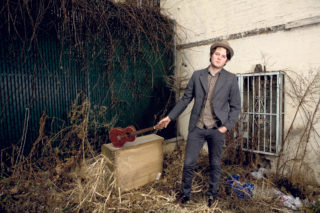Beirut on shaking the acoustic pop apple cart
Curating a musical European utopia

Curating a musical European utopia
“Shouting the loudest no longer gets you the most attention,” says Zach Condon, the creative force behind Beirut. And in a very noisy world, this rings true. Beirut’s delicate melodies and nostalgic charm have caught more attention from the public and critics alike in the past two years than any ‘dance punk’ or ‘new goth’ could have hoped to.
Bohemian and melancholy, Beirut’s music paints a nostalgic portrait of Europe – evocative of hazy Italian summers, gypsy fairs and faded glamour. It’s an image reflected in the band’s album artwork and, most strikingly, via the video for single ‘Elephant Gun’, in which Condon – front man, songwriter and multi-instrumentalist – cuts the perfect figure of a finely moustachioed young man transported from Bohemia via Long Island circa 1908; what he describes as a “purposeful but natural” image.
It seems an odd concept for a 23 year old from Santa Fe, New Mexico, with a background in dance and electro, to pull off so beautifully. Previous projects include pseudonyms Real People and 1971, both electronically influenced. But then, Zach wasn’t the average American teenager, either wrapped up in the US Dream or violently rebelling against it.
“My earliest obsession was of Europe as a kind of Utopia compared to suburban America,” says Condon. “As a teenager I worked in an independent cinema that only showed European movies and these images of Europe sort of… caught my head. It was working there that I saw films such as ‘Peirrot le Feu’ [Jean Luc Godard’s French, new wave masterpiece] and the Italian film ‘The Way we Laughed’ that caught my attention.”

As for the nostalgic atmosphere, found on debut album ‘Gulag Orkestar’ in particular, “I suppose certain interests, particularly in music, skip generations,” says Condon. “I grew up a decently shy child, and Santa Fe is really isolated musically. When I found anything outside of it, it caught my interest.” European folk is about as far outside of Santa Fe as one could hope for.
Beirut began as a solo project, when a 17-year old Zach moved to New York and formed a live band to perform under the moniker. Although he continues to be the primary songwriter, his band contribute more to the project as things move on, the current cast consisting of Kelly Pratt, Perrin Cloutier, Jason Poranski, Nick Petree, Kristin Ferebee, Paul Collins and Jon Natchez. And the 9-strong group is a perfect example of how rebellion and contradiction change according to what has become normality. Now that genres such as punk and metal are as mainstream as assembly-line pop, sweeping melodies and composition – in the same vein as Arcade Fire, Final Fantasy and Patrick Wolf – seem to be the alternative choice.
“I picked up the trumpet to rebel against the guitar lessons my Dad arranged for me,” laughs Condon now. “I suppose that is the opposite of what most kids would do.” Similarly, Beirut’s original interest was in dance and electro music – something his family were keen for him to revisit. “Dance music is kind of my escape from Beirut. They’re completely opposite; it’s a real Jekyll and Hyde scenario. Real People [Condon’s electronic side project] experiment with very different sounds to Beirut. Although my friends and family told me they like the Beirut stuff, they still had a place in their hearts for the electronic music that I’ve always worked on. So they convinced me to collect a few songs and release them on the double EP.”

Ah, yes, the forthcoming EP; a double disk release of ‘March of the Zapotech’ by Beirut and ‘Holland’ by Real People, a testimony to the breadth and imagination of Condon’s song writing abilities. Whether turning his hand to electronic music or working with a Mexican Funeral Band – as on ‘March of the Zapotech’, recorded in Mexico with the assistance of the 19-piece Jimenez Band – Condon’s songs retain a kind of elegance rarely found in “pop music.”
“I try to explain Beirut as acoustic pop, and keep it vague,” says Condon. “To explain it to strangers I’ve made up a few genres in the past but, at its core, it really is acoustic pop.”
However, Beirut are a far cry from the average acoustic folk band. Musically they owe more to Balkan gypsy folk than to the usual acoustic pop influences of Bob Dylan and Neil Young, inspiration that was gathered on two trips to Europe with Zach’s brother Ryan, along with his general interest in European culture. Mandolin, ukulele, accordion, glockenspiel, euphonium [a brass instrument] and violin replace the more conventional pop instruments of guitar, bass and keys.
Along with Patrick Wolf, Condon is one of the considerably few people in pop who favour Ukulele over guitar, despite not actually knowing much about the instrument.
“I was recently interviewed for a ukulele magazine,” remembers Zach who no longer plays much guitar due to a wrist injury, sustained falling off a bridge. “It was an interview just about the Ukulele as an instrument. It was pretty funny because I don’t know anything about the ukulele, other than the chords I play. It just interested me. I didn’t just pick it up as an alternative to the guitar, but because my wrist is slightly shorter it’s not easy to hold the neck of a guitar.”
Lyrically too, Beirut stray away from the usual ‘acoustic pop’ formula, opting for lyrics that are “Flowery but absurd,” as described by their author. “Lyrically, I take a lot from my brother, Ryan, who writes the blogs on my website. I try to sync my voice with his because I like the way he writes – it’s kind of flowery but absurd. But I dislike the process of writing lyrics. I get into a kind of fever when I’m writing music, and everything is building up and getting bigger and bigger… and then I have to slow down, basically come to a complete halt, and use a completely different part of my brain. It takes away the flow, because I have to suddenly become more rational. It’s not a struggle so much, and I do like to have interesting lyrics, but it is a different creative process and involves engaging a very different part of my brain.”
Beirut’s nostalgic and imaginative song writing is an inspiring alternative to the indie-pop average; ‘March of the Zapotech’ will be proof of that to the uninitiated and confirm Zach Condon’s versatility to the already familiar. Following in the footsteps of song writers such as Win Butler and Owen Pallott, this is intelligent and genuine music, evocative of a golden era and place that never really existed.